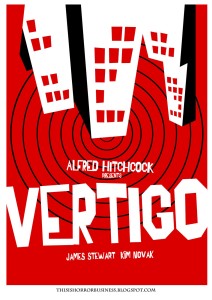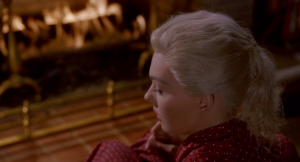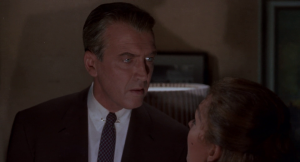
Vertigo (Alfred Hitchcock, USA, 1958, 128 min)
Wisconsin Film Festival, Saturday, April 5, 1:45pm»
Vertigo (1958) has recently been placed at the top of Sight and Sound’s list of 100 top movies, ending Citizen Kane’s domination that started in 1962. Though Vertigo is now recognized as a masterpiece, not to mention Hitchcock’s best film, Vertigo was considered a flop when first released. Hitchcock believed that Vertigo’s lack of box office success was partly due to James Stewart (Vertigo‘s Scottie Ferguson) looking too old. When it came to casting North By Northwest, despite Stewart’s interest, Cary Grant was cast as the lead role. Grant is older than Stewart, but I suppose he does have a more youthful attitude. Vertigo was the last film Hitchcock made with Stewart.
But luckily James Stewart was cast as Vertigo‘s Scottie. No one else could have played the role quite as well. He emits the perfect combination of victim and aggressor, loving and controlling, strong and unstable. Scottie is undoubtedly attractive, but there is something off about his character, a bit creepy even. If Cary Grant had played Scottie his charming, screwball nature would have made this mysterious thriller into a light drama. The impact would not be the same. Stewart offers the intriguing and haunting quality that makes Vertigo into a masterpiece and on top of many best movie lists.
Two scenes in Vertigo exquisitely demonstrate Stewart’s precise fit in the role of Scottie Ferguson: the scene at Scottie’s apartment after fishing Madeline out of the bay, and the scene in Judy’s apartment when he ultimately persuades her to dye her hair.

In the beginning of the film Scottie is hired by Gavin Elster (Tom Helmore) to trail his wife, Madeline (Kim Novak), in order obtain the reason for her recent peculiar behavior. It is not until forty-five minutes into the film, after Scottie follows Madeline for days and to many locations, that he finally comes face-to-face with her. When he witnesses her leap into the San Fransisco bay he jumps in after her. He then brings her to his apartment, and at this point both Scottie and the audience believe that it is Scottie who is the secretive one with the ulterior motive. Helies to Madeline and delicately digs around for information without exposing who he is and why he was really following her. He is comforting and kind to her, offering her coffee and a place by the fire, but also intrusive and manipulative, and this whole scene is filled with unexpected sexual tension that builds between the two characters. His motives develop during this scene from a mere job into lust, but he doesn’t know, and neither does the audience, that Madeline is the one fooling him, manipulating the situation so that the right assumptions are made.

In the scene where Scottie convinces Judy (also Novak) to change her hair color, after forcing her to buy the same outfit Madeline wore, Stewart’s instability is more profound. At the beginning of the scene Judy is obviously upset, laying over a darkly lit table. Scottie offers her a glass of liquor as medicine. She desperately asks him why he is doing this, trying to makeher over like a lost love, but he is unable to give her an answer. He doesn’t know. All he knows is that he has this possessive desire to change her, and through his comforting domination he convinces her to dye her hair blonde, “It can’t matter to you” he says. Scottie has a manipulative control over Judy but since he retains a kind sincerity, his requests do not seem as crazy as they actually are. The scene ends with Scottie staring at her as she sits next to the fire.
I love James Stewart, and will watch a film just because he is in it. His normal characters are always intelligent, level-headed, good-natured men that I can’t help but drool over. Consider his roles in Its a Wonderful Life, Mr. Smith Goes to Washington and You Can’t Take It with You. But Vertigo required a quality in addition to the innocence he usually played, a creepy element had to be added and Stewart executes this combination perfectly. Vertigo is Stewart’s best film, and it is largely because of him that this film has become a classic.